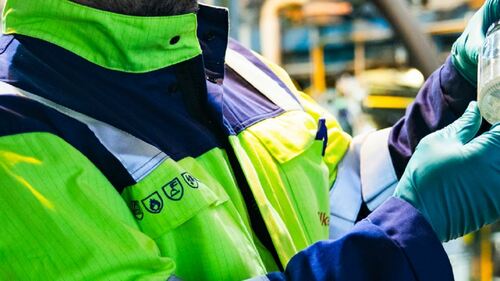Elkem reaches major milestone in advancing the circular economy for silicones in Lyon France
This marks a significant milestone in driving the transition to a circular economy for silicones.
As part of its climate strategy, Elkem is committed to cutting CO₂ emissions and resource-use to reach climate-neutral production by 2050, notably by increasing recycling in its own operations and developing circular loops with customers and suppliers. In 2021, Elkem initiated a collaborative project* dedicated to breaking down silicone waste, using eco-designed depolymerization methods. This project led to the implementation of innovative routes and processes for the recycling of silicones that are patented by Elkem and partners and embedded in the construction and operation of the unit at Saint-Fons. Recycling silicones reduces their carbon footprint and contributes to securing the provision of the critical raw material, demand for which is rising due to the green transition and digitalization.
The technical implementation of the chemical recycling is now being performed at a pilot scale. This marks a major milestone in Elkem’s journey towards offering recycled silicones to the market. The pilot unit will provide vital scale-up information for safe and energy-efficient recycling of silicones at the industrial scale, and supply Elkem’s target customers with representative quantities of silicone with recycled content.
“As a manufacturer of silicones since 1948 and leading global supplier of silicones, we are committed to creating a circular economy for our products, giving them a second life. Chemical recycling of silicones is a key technological enabler to close the loop. Through our innovative technology, we can provide a solution for silicone waste and offer low carbon solutions from recycling with the same quality as those made from virgin material to the market,” says Joséphine Munsch, Sustainability Project Leader at Elkem.
Elkem’s patented depolymerization process technologies offer multiple unique benefits, such as low process temperatures, which enable lower carbon emissions, high conversion rates and chemical selectivity that avoids the generation of undesirable by-products and residues.
This project** was funded by the France 2030 national innovation and industry investment programme, operated by ADEME (the French Agency for Ecological Transition), and the European Union’s NextGenerationEU fund.
*Elkem’s collaborative project, known as the Resourcing Silicones Polymers (REPOS) project, focuses on developing eco-friendly depolymerization chemistry to reduce silicone waste. REPOS has been developed with CP2M and IMP academic labs, and the SMEs Activation and Processium. This project received the support and funding from Région Auvergne-Rhône-Alpes et BPI France and labelled by Axelera.
** The funded project ROSE UPP is dedicated to the scale up of chemical recycling technologies.
Latest news
NEXTCHEM awarded a feasibility study by Mana Group and Equinor for the production of sustainable fuels in Norway leveraging its NX Circular™ technology
With the support of NEXTCHEM, Mana (NG Nordic) and Equinor are entering an early-stage strategic partnership to explore the potential development of the Nordics' first large-scale waste-to-methanol...
A circular economy pioneer
REMONDIS' Lippe Plant →Founded back in 1991, RETERRA has transformed itself from a regional composting business into a nationwide biomass management specialist.
ECLUSE Scheldt Tunnel Completed: Belgium’s longest microtunnel is now a reality
Port Of Antwerp →Work on extending the ECLUSE steam network from the left to the right bank of the Scheldt has reached a major milestone. The tunnel that will carry the pipelines beneath the river has now been comp...
PureCycle Receives REACH Certification, Unlocking EU Sales of PureFive™ Resin
Port Of Antwerp →PureCycle Technologies has received the REACH Certificate of Compliance, allowing the Company to sell PureFive™ resin to customers in the European Union. PureCycle has plans to build its first Euro...

